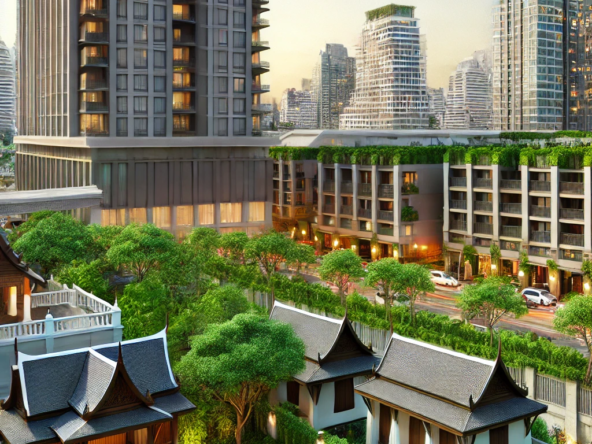With Thailand’s tourism sector rapidly rebounding post-pandemic, the country has reaffirmed itself as a premier destination in Southeast Asia, attracting millions of visitors each year. In 2023 alone, Thailand welcomed over 28 million foreign tourists, generating more than 1.2 trillion baht in revenue. This resurgence in tourism is having a profound effect on property prices, particularly in high-demand tourist areas. For investors, understanding the impact of tourism on Property prices in Thailand compared to other Southeast Asian countries is essential for identifying profitable opportunities. This article examines the latest trends, city-specific dynamics, regional comparisons, and investment considerations to help investors make informed decisions.
1. Tourism in Thailand: A Revitalized Economic Driver
As one of the leading tourist destinations in Southeast Asia, Thailand’s tourism sector contributes significantly to its economy, accounting for close to 20% of GDP. Post-pandemic tourism recovery has been robust, with year-on-year growth in foreign tourist arrivals outpacing neighboring countries. This resurgence has been a key factor in the property market’s revival, particularly in high-tourism areas where international demand drives property prices upward.
Compared to other countries in the region, Thailand’s rapid tourism recovery—up by 39% year-on-year as of 2024—positions it as a favorable destination for property investment. This growth in arrivals is contrasted with slower recoveries in markets like Indonesia and Malaysia, where both infrastructure and tourism activity are still stabilizing.
2. The Direct Impact of Tourism on Property Demand and Prices in Thailand
Demand for Condominiums and Vacation Homes
The influx of tourists, particularly from high-income countries, has increased demand for vacation properties and investment condos. In Bangkok, Sukhumvit and Silom districts have seen consistent price rises driven by demand for centrally located condos. Under Thai ownership laws, foreigners can buy up to 49% of a condominium building, making these units especially attractive for international investors. In Phuket, demand for vacation homes and luxury condos has similarly surged, with Chinese and Russian buyers driving demand for high-end beachfront properties.
Growth in the Short-Term Rental Market
Short-term rental platforms like Airbnb have significantly influenced property prices in popular tourist destinations such as Bangkok, Pattaya, and Phuket. The ability to rent properties to tourists has led to high rental yields, driving demand for condos and vacation homes that cater to the short-term rental market. Central districts in Bangkok, beachfront locations in Phuket, and nightlife-rich Pattaya are particularly popular, with high rental yields making them attractive to investors focused on short-term rentals.
Expansion of Luxury and Branded Residences
Thailand’s appeal to affluent international tourists has spurred demand for luxury and branded residences. Recent high-profile developments in Bangkok, such as the construction of what is slated to be one of the tallest buildings in the world, signal the city’s growth and continued demand for high-end real estate. These properties, often associated with well-known hotel brands, attract high-net-worth individuals, adding upward pressure on prices in both urban and resort areas.
3. City-Specific Impacts of Tourism on Property Prices
Bangkok: Growth Driven by Tourism and Urban Development
Bangkok is the epicenter of Thailand’s real estate market, driven by its role as both a business hub and tourist hotspot. With tourist arrivals surpassing pre-pandemic levels, demand for properties in central districts such as Sukhumvit, Silom, and Sathorn has increased. The development of mega-projects, including new luxury hotels, shopping complexes, and high-rise condominiums, continues to attract investment. For example, the anticipated tallest building project in Bangkok reflects the city’s growth trajectory and demand for premium real estate. Investors can benefit from Bangkok’s strong rental yields but should be aware of potential regulatory changes affecting short-term rentals.
Phuket: Coastal Demand and Market Sensitivity
Phuket, renowned for its beaches and luxury resorts, remains a prime target for foreign buyers seeking vacation homes. Demand for luxury beachfront properties has surged, particularly from Russian and Chinese buyers. However, Phuket’s property market is sensitive to fluctuations in global tourism trends, as demonstrated by the price drops during the COVID-19 pandemic. The ongoing appeal of Phuket’s natural beauty continues to drive property values, although investors should account for the market’s inherent volatility.
Chiang Mai: A Rising Hub for Cultural Tourism and Wellness
Chiang Mai has emerged as a popular destination for wellness tourism, digital nomads, and retirees. The city’s rich cultural heritage, alongside its growing reputation for eco-tourism, has increased demand for properties, particularly in central and scenic areas like the Old City and Nimmanhaemin districts. Chiang Mai’s property market has seen steady growth, supported by eco-friendly developments that cater to long-stay tourists and expatriates. New projects focused on sustainable living make it an attractive option for investors looking for stable growth with an emphasis on wellness and sustainability.
Pattaya and Hua Hin: Investment Potential in Emerging Tourist Cities
Pattaya and Hua Hin have both seen increased interest from tourists and property investors. Pattaya’s vibrant nightlife and proximity to Bangkok make it popular for short-term rentals, while Hua Hin’s more serene environment appeals to retirees and long-stay tourists. Both cities offer a mix of residential and hospitality sector opportunities, with property values on a steady upward trend. Hua Hin has become particularly attractive for retirees from Europe, while Pattaya is favored by tourists looking for a convenient getaway from Bangkok. For investors, these cities offer promising returns in the short-term rental market and retirement living.
4. Comparing Thailand’s Real Estate Market to Southeast Asia
Thailand’s property market stands out in Southeast Asia due to its rapid tourism recovery and investor-friendly policies. The 39% year-on-year increase in tourist arrivals in 2024 demonstrates Thailand’s appeal compared to neighboring markets. Meanwhile, Indonesia’s Bali and Malaysia’s Kuala Lumpur have seen slower recoveries, with property prices rising at a more modest pace. Thailand’s favorable foreign ownership rules for condominiums, cost of living, and developed infrastructure make it an attractive investment destination in a competitive Southeast Asian landscape.
Property Price Trends Across Southeast Asia:
- Thailand: Rising demand in tourist cities like Bangkok and Phuket, with property prices up 7% year-on-year.
- Indonesia (Bali): Moderate growth in tourist-driven areas, but regulatory restrictions on foreign ownership limit investment appeal.
- Malaysia: Slower property price recovery in Kuala Lumpur, although relatively affordable real estate and rental yields attract some investors.
- Vietnam: Da Nang and Ho Chi Minh City show high growth, but complex foreign ownership laws pose challenges.
5. Key Considerations for Property Investors in Thailand
Market Sensitivity and Diversification
Thailand’s reliance on tourism makes its property market sensitive to external economic changes. For example, Phuket’s property prices declined significantly during the pandemic, highlighting the market’s volatility. Investors should consider diversifying their portfolios across Thailand’s cities to mitigate risks. Bangkok offers more stability due to its business and residential markets, while Chiang Mai provides steady, wellness-driven demand.
Regulatory Environment and Ownership Laws
Thailand’s property laws are relatively favorable for foreign investors, particularly in the condominium market where foreigners can own up to 49% of units in a building. However, the short-term rental market is subject to ongoing regulatory review, with potential new restrictions on platforms like Airbnb. Investors targeting rental income should stay updated on local regulations to ensure compliance and maintain profitability.
Sustainable Development Opportunities
Eco-conscious tourism is gaining traction in Thailand, especially in areas like Chiang Mai and the islands. Sustainable property developments aligned with eco-tourism trends could offer long-term investment benefits. Investors interested in Chiang Mai, for example, might find appeal in eco-friendly residences that cater to wellness tourists and environmentally aware expatriates.
6. Future Outlook and Investment Recommendations
Continued Growth in Prime Markets
Thailand’s real estate market is expected to continue growing in popular tourist areas. Bangkok’s property market benefits from its dual role as a business and tourist center, while Phuket and Pattaya attract investors interested in high rental yields. The current momentum in tourism and property development in these cities is likely to continue, though fluctuations tied to global tourism trends are expected.
Strategic Recommendations for Investors
- Target High-Growth Cities: Bangkok and Phuket offer the strongest growth potential for investors interested in short-term rentals and luxury real estate. Pattaya and Hua Hin provide steady returns for those interested in retirement-focused investments.
- Stay Informed on Local Regulations: Short-term rental markets are evolving, particularly in tourist-heavy areas. Investors should stay informed on regulations to ensure compliance and maximize rental income.
- Consider Sustainable Properties: Eco-friendly developments in wellness-oriented areas like Chiang Mai align with tourism trends and may attract a premium from buyers and renters.
Conclusion: Is Thailand a Good Investment Compared to Other Southeast Asian Markets?
Thailand’s thriving tourism industry and favorable foreign investment climate make it a competitive real estate market in Southeast Asia. Its rapid tourism recovery, relative affordability, and diverse property market provide attractive opportunities for international investors. While markets like Indonesia and Malaysia offer some appeal, Thailand’s strong rental yields, investor-friendly policies, and vibrant tourism growth give it an edge.
For investors considering Southeast Asia, Thailand stands out as a dynamic market with high growth potential in tourist-driven real estate. With careful planning, Thailand offers a compelling mix of high-yield investment opportunities in a vibrant and resilient real estate market.



